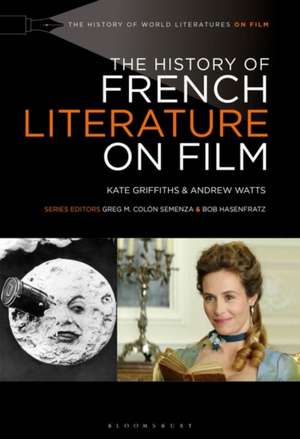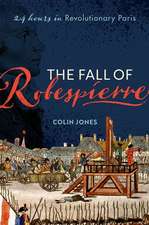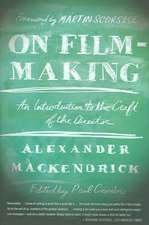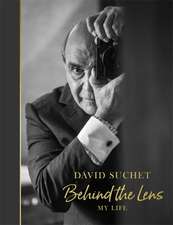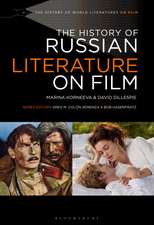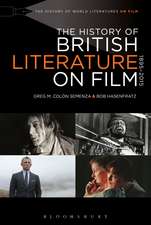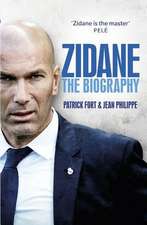The History of French Literature on Film: The History of World Literatures on Film
Autor Kate Griffiths, Andrew Wattsen Limba Engleză Hardback – 23 dec 2020
| Toate formatele și edițiile | Preț | Express |
|---|---|---|
| Paperback (1) | 199.64 lei 6-8 săpt. | |
| Bloomsbury Publishing – 29 iun 2022 | 199.64 lei 6-8 săpt. | |
| Hardback (1) | 629.59 lei 6-8 săpt. | +44.48 lei 4-10 zile |
| Bloomsbury Publishing – 23 dec 2020 | 629.59 lei 6-8 săpt. | +44.48 lei 4-10 zile |
Preț: 629.59 lei
Nou
Puncte Express: 944
Preț estimativ în valută:
120.49€ • 130.83$ • 101.21£
120.49€ • 130.83$ • 101.21£
Carte tipărită la comandă
Livrare economică 22 aprilie-06 mai
Livrare express 15-21 martie pentru 54.47 lei
Preluare comenzi: 021 569.72.76
Specificații
ISBN-13: 9781501311840
ISBN-10: 1501311840
Pagini: 328
Ilustrații: 47 bw illus
Dimensiuni: 152 x 229 x 26 mm
Greutate: 0.6 kg
Editura: Bloomsbury Publishing
Colecția Bloomsbury Academic
Seria The History of World Literatures on Film
Locul publicării:New York, United States
ISBN-10: 1501311840
Pagini: 328
Ilustrații: 47 bw illus
Dimensiuni: 152 x 229 x 26 mm
Greutate: 0.6 kg
Editura: Bloomsbury Publishing
Colecția Bloomsbury Academic
Seria The History of World Literatures on Film
Locul publicării:New York, United States
Caracteristici
Challenges stereotypical notions of adaptation as a derivative practice, and invites readers to consider instead the ways in which film versions of canonical texts enable us to reinterpret the original material
Notă biografică
Kate Griffiths is Professor of French and Translation Studies at Cardiff University, Wales, UK. She has published widely on the multimedia adaptation of literary sources. Her first book focused on literature and cinema (Zola and the Artistry of Adaptation, 2009) and her second on multi-media adaptation of nineteenth-century texts (Adapting Nineteenth-Century France, 2013). Her third book analysed the relationship between literature and television, (Zola and the Art of Television, 2020) She is currently working on a monograph on the adaptation of world literature on BBC radio.Andrew Watts is Reader in French Studies at the University of Birmingham, UK. He is the author of Preserving the Provinces: Small Town and Countryside in the Work of Honoré de Balzac (2007), co-author (with Kate Griffiths) of Adapting Nineteenth-Century France: Literature in Film, Theatre, Television, Radio and Print (2013), and co-editor (with Owen Heathcote) of The Cambridge Companion to Balzac (2017). He has written numerous articles and book chapters on multimedia adaptation, most notably in relation to nineteenth-century French literature.
Cuprins
List of FiguresAcknowledgementsIntroductionKate Griffiths1.The Currency of Adaptation: Art and Money in Silent Cinema (1899-1929)Andrew Watts2.Who is Adaptation? Interpersonal Transactions in Film (1927-39)Kate Griffiths3.Politics, Propaganda, and the Censored Screen: Adapting French Literature during the German Occupation (1940-44)Andrew Watts4.The Formative Function of the Dominant Film Poetics: The Impact of Film Movement, Moment, and Genre (1945-70)Kate Griffiths5.The History of Adaptation/Adaptation and History (1970-2004)Kate Griffiths6.Textual Migration and Adaptive Diaspora: French Literature Adaptations Beyond France (1996-2016)Andrew WattsConclusionAndrew WattsBibliographyIndex
Recenzii
Kate Griffiths and Andrew Watts pass the baton of adaptation between them, chapter to chapter, and never flag in their 125-year relay race through film history. They focus on French literary sources because so many producers, directors and spectators-not just French ones-have always done so. Across wildly distinct periods of national and transnational history, French literature has been passed around, becoming itself a highly valued cultural relay. It has been honored, toyed with, profited from, and often re-energized in an unregulated fairground economy that the authors delight in exposing.
Bold in its historical and transnational scope, incisive in its argument, and illuminating in its analysis, The History of French Literature on Film is a milestone achievement - a study of deep value to researchers in adaptation studies, film studies, translation studies, and cultural history. Griffiths and Watts offer a vision for how we should value adaptation for its intrinsic innovation and also, crucially, for what the adaptive process reveals of our world and times, present and past, as it shapes and is shaped by social, economic, interpersonal, political, aesthetic, contextual, and diasporic pressures and possibilities across cinema's long history. Important revisionist readings of 'Tradition of Quality' cinema and 1970s porn bring fresh angles to film studies, and to wider research in 'middle-brow' cultures and postcolonial studies. Expert discussion, abundant insights, and sheer clarity of prose make this a compelling title for readers in search of a sense-making study of the agency and the porosity of film adaptation across the long twentieth century.
This rich and thought-provoking volume will instantly become required reading for anyone teaching, or studying, screen adaptations of French literature.
Bold in its historical and transnational scope, incisive in its argument, and illuminating in its analysis, The History of French Literature on Film is a milestone achievement - a study of deep value to researchers in adaptation studies, film studies, translation studies, and cultural history. Griffiths and Watts offer a vision for how we should value adaptation for its intrinsic innovation and also, crucially, for what the adaptive process reveals of our world and times, present and past, as it shapes and is shaped by social, economic, interpersonal, political, aesthetic, contextual, and diasporic pressures and possibilities across cinema's long history. Important revisionist readings of 'Tradition of Quality' cinema and 1970s porn bring fresh angles to film studies, and to wider research in 'middle-brow' cultures and postcolonial studies. Expert discussion, abundant insights, and sheer clarity of prose make this a compelling title for readers in search of a sense-making study of the agency and the porosity of film adaptation across the long twentieth century.
This rich and thought-provoking volume will instantly become required reading for anyone teaching, or studying, screen adaptations of French literature.
